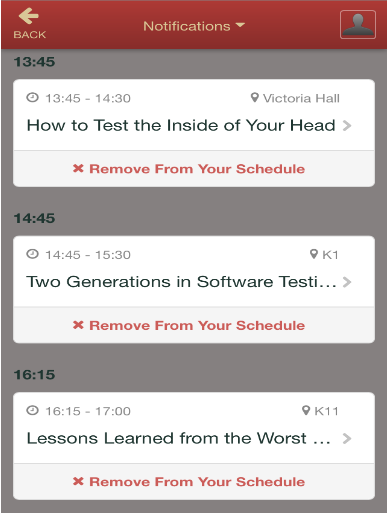The 24th edition of EuroSTAR Conference has started today with a great series of full day tutorials.
I have just arrived in Stockholm and I am getting ready for tomorrow: looked for the notebook and the pens in the luggage, prepared the comfy shoes and the testing pins. How about putting down some thoughts on tomorrow’s agenda?

Like I mentioned in my previous post, I am eager to listen to the first keynote. What have the organizers selected to open the conference with? I bet it was a difficult decision. I expect it to be inspiring, most keynotes are. The description leads in that direction: Liz Keogh says that in this talk we look at some common bugs inside our head, and some different ways in which we can test for them, fix them or simply work around them, helping us to be more observant and mindful of our uncertain and ever-changing world.
After that, from 3 PM there are four presentations and a workshop in parallel. Irfan Ahmad will talk about Understanding Cultural & Linguistic Dimensions in Testing, focusing on decoding the complex environment of localization and linguistic testing. On another track there’s Jan von Moll with whom participants will learn how to perform powerful Root Cause Analysis, using real-life examples. Paul Coyne will talk about Where Steve Jobs Went Wrong, starting from the premise that Steve had it completely back to front: we should not learn to code in order to become better thinkers. We should learn to think in order that those who code can do it better. Moreover, Jon Bach will deliver an interactive workshop on Reinventing Your Testing Role: achieving deep understanding and ownership over your practices and motivations, knowing why you do what you do, and being able to explain it to others.
In this time slot I plan to attend Gitte and Christian Ottosen’s presentation. Representatives of two generations, they will walk us through different ways of learning: what worked, what didn’t, thoughts about how they expect to learn and develop their craft in the future. I can see this topic already triggering an introspection: how did I learn so far? Which ways worked for me? Which didn’t? You’ll read the answers in my next review.
At noon I hope I get to visit the expo. “Stand hopping” is something I enjoy doing, as it challenges me to interact with different persons, from various business areas and maybe with different cultural backgrounds.
At 16:15 another series of presentations starts. One is How We Learned to Love Quality and Stop Testing delivered by Sally Goble. Quite an intriguing title for a testers’ conference, isn’t it? Furthermore, there is a talk about Culture Brokering in Software Testing delivered by Predrag Skokovic, where we could learn about concepts like culture brokering, culture and linguistic competence. Tips for Introvert and Extrovert Testers is a presentation delivered by Anne-Mette Hass aiming to help testers get a better understand of themselves and each other, and hereby get the most out of working together, both personally and professionally.

I myself will attend Ru Cindrea’s talk about the worst bug she had found. The presentation is built around the Signal Detection Theory applied to testers: finding the right balance between misses and false alarms when hunting for bugs and using credibility to provide the right information to stakeholders making decisions about fixing defects.
Tuesday conference will finish with the second keynote: The Critique of AI in the Age of the Net. Harry Collins from Cardiff University will present insights from the sociology of science relationship of humans and intelligent machines.
In closing the first conference day, in a change from previous years, the Conference Awards Night will take place. As well as the 18th conferral of the EuroSTAR Software Testing Excellence Award, the night will include awards for Best Conference Paper and Best Tutorial as determined by conference attendees.
Altogether, the first day of the conference gathers a fine collection of opportunities to learn about testing and beyond. I’m looking forward to discover it!
